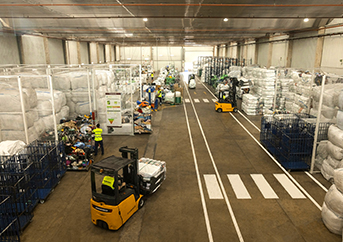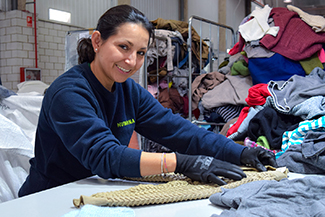consent_cookie
Duración: 1 year
Stores the user's cookie consent state
19-06-2025
Humana Fundación Pueblo para Pueblo and the Centre de Gestió Mediambiental (CGM) are leading one of the projects awarded in the first call for Circular Economy PERTE grants for the textile sector. The social economy entity and the Catalan company submitted a joint initiative and have been awarded part of the EU's Next Generation funds, which will be used to improve and optimize the preparation processes for reuse and recycling of post-consumer textiles.
Last April, the Ministry for Ecological Transition and the Demographic Challenge, through Fundación Biodiversidad,, presented the list of the first (provisional) Circular Economy PERTE grants for the textile sector. This is the vehicle created by the Government to channel part of the EU's Next Generation funds to the strategic sectors of the plastics, renewable energy, and textile and fashion industries.
“This award is a boost to the efficient and professional management of textile waste promoted by Humana,” says Rafael Mas, the organization's Director of Projects and External Relations, adding: “Humana's management of used textiles has never depended on external aid to remain competitive and has survived since 1987, generating quality green jobs and training PxR professionals with a high level of market knowledge. This support will allow us to be even more competitive.”
Mariano Mestres, CEO of CGM, affirms that “this support will allow us to develop practical and effective action in Catalonia on non-reusable textile waste and provide much-needed infrastructure to address the new recycling challenges in the textile sector.”
In the category of third-party waste management projects, nine projects have been proposed for provisional resolution. One of them, and the highest-rated, is the one led by Humana and CGM, which have received a grant of €1.32 million and €1.58 million, respectively.
The project's objective is to "increase the amount of post-consumer textile waste destined for reuse (Humana), while also implementing high-quality recycling of the non-reusable fraction (CGM) in Spain."
Investment allocation
Humana will mechanize and optimize the textile waste sorting system at its Leganés (Madrid) plant, which is currently primarily manual. The future system will include conveyor belts that optimize the flow of clothing during processing; improve worker ergonomics; and install auxiliary laundry and drying systems.
For its part, CGM will invest in optical textile waste separation technology by composition and color. This will allow them to separate textile waste for high-quality recycling, essentially using NIR cameras to detect material composition; RGB cameras to determine the color, shape, and texture of garments; and artificial intelligence tools, such as deep learning algorithms, to determine the garment category. This will facilitate the reintroduction of post-consumer textiles into the production chain, thus closing the cycle.
Currently, 63% of the textiles managed by Humana are reused, 28% are recycled, and the remainder is disposed of and disposed of as unsuitable materials. With the future management process and the creation of a new and strategic value chain between Humana and CGM, the disposal of the fraction destined for recycling will be reformulated. Currently, this 28% is exported to Asian countries for downcycling. Thanks to the synergy created by this project, these post-consumer textile materials can be processed in Spain through high-quality separation.

